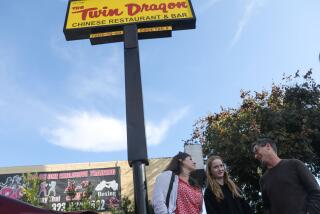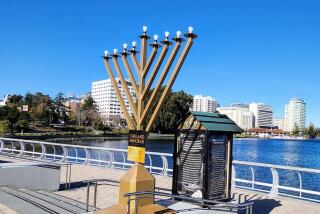Ushering in a ‘green’ Hanukkah
Some Jewish communities throughout the Southland celebrated the first night of Hanukkah with a twist Sunday, as one group cooked a giant potato latke in a solar-paneled oven and another lit candles atop a recycled menorah -- all part of an effort to usher in an eco-friendly Festival of Lights.
“With the new president [of the United States] coming in, the whole thing is about the environment,” said Rabbi Marc Rubenstein outside Temple Isaiah of Newport Beach, where parishioners in the frontyard crowded around the solar oven that was harnessing the sun’s heat to cook a potato pancake, or latke, that measured about 3 feet across.
Rubenstein said he gave a sermon to the 100-family congregation Friday night focused on the environment, with the central message that “we are our brother’s keeper, and we also have to take care of the Earth.”
“The whole idea of Judaism is tikkun olam,” Rubenstein said, referring to the Hebrew phrase meaning to repair or perfect the world.
Synagogue members hoped the latke would break a record as the world’s largest cooked by a solar oven.
A celebration in Riverside included a menorah made of recycled wood, succulent plants, roses and other flowers.
“We’re living in a time where we recognize how important it is that we care for each other and care for this world,” said Rabbi Shmuel Fuss of the city’s Chabad Jewish Community Center.
“We recognize that we’re in a global world,” Fuss added. “This is our way of acting on it.”
The events are part of a national trend of synagogues and churches going “green” for the holidays.
But it’s not enough, said Rabbi Arthur Waskow of the Shalom Center in Philadelphia. He gave the collective efforts “like a D-minus,” saying there is much more work to be done.
“All over the country, there are bits and pieces, here and there,” Waskow said. “We find that there’s beginning to be serious energy about things like using solar energy in the synagogue. But even now it’s mostly symbolic.”
However, “that’s beginning to grow,” he said.
About 2 1/2 years ago, Waskow said, his center started a program called the Green Menorah Covenant, with the ultimate aim of cutting oil consumption by seven-eighths by 2020.
The goal is symbolic of the story of Hanukkah: After the Maccabees revolted more than 2,000 years ago, they found only enough oil to last one night at the rededication of the Temple in Jerusalem. But the oil lasted eight days.
“That one day’s oil should serve eight days’ need,” Waskow said of his organization’s goal.
Environmental groups have advocated for years that the winter holidays be used as an opportunity to make people mindful of waste and to promote energy conservation.
“Environmental Defense Dreams Of A Green Christmas, Chanukah & Kwanzaa” was the title of one list of tips distributed by the Environmental Defense Fund. Among the suggestions: buying a Christmas tree that can be replanted, sending holiday cards made with recycled paper and using recyclable wrapping paper.
Suzanne Jones of the company emagineGreen set up a booth in front of Temple Isaiah on Sunday and, while the latke cooked, tried to coax parishioners to purchase her eco-friendly goods.
She generally drives across the region, meeting with groups of women and coaching them about how they can conserve. In recent years, she said, she has received a growing number of calls from churches and other religious organizations.
For her own holiday presents this year, Jones said, “I’m giving everyone at least one reusable bag.”
--
More to Read
Sign up for Essential California
The most important California stories and recommendations in your inbox every morning.
You may occasionally receive promotional content from the Los Angeles Times.










